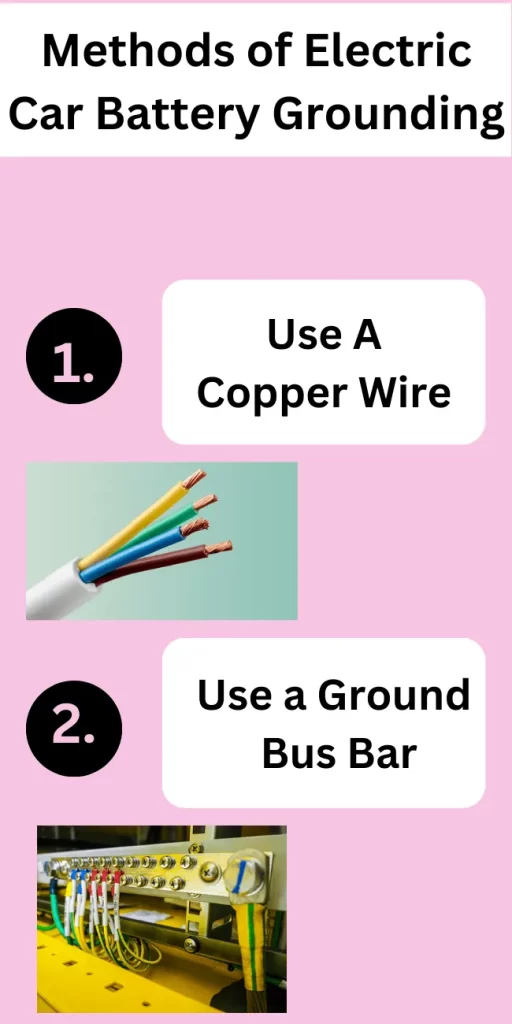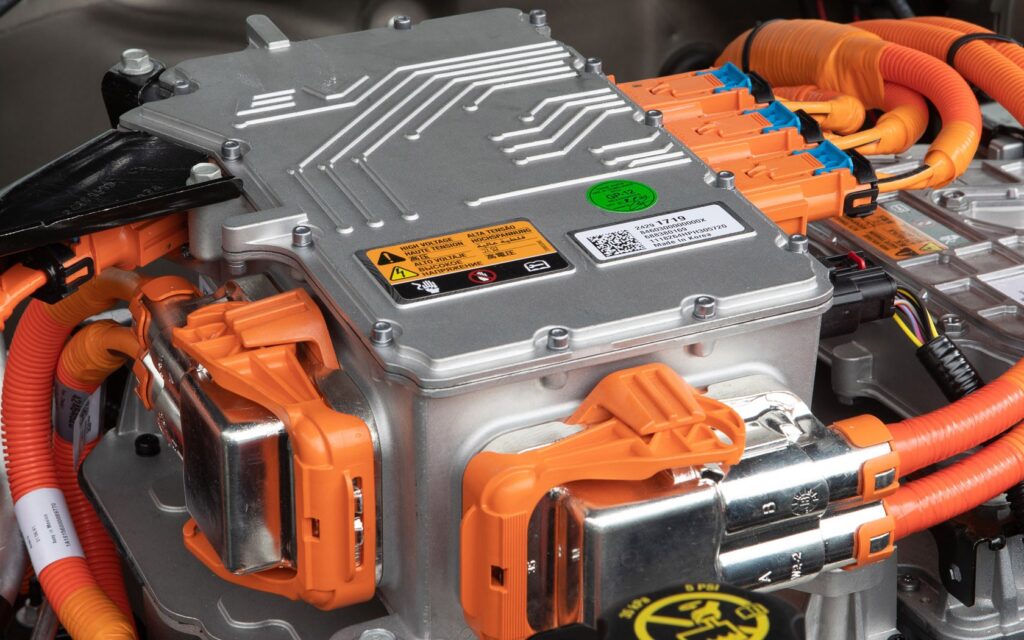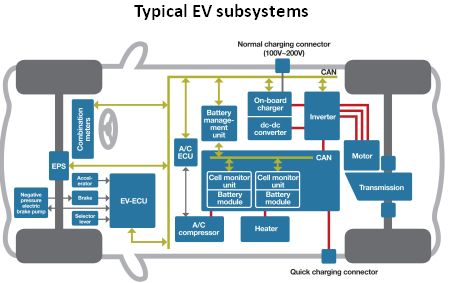
As the number of electric vehicles (EVs) on the road continues to grow, so does the need for a reliable and effective electric vehicle battery grounding system. what does it mean by basics of electric vehicle battery grounding?
A well-designed electric vehicle battery grounding system is essential for ensuring the safety of the vehicle and its occupants and protecting the battery from damage.
There are a few different ways to ground an EV battery, but the most common and effective method is to use a copper strap. This strap is attached to the battery’s negative terminal and then runs to the vehicle’s chassis.
Methods of electric vehicle battery grounding:
- Use of copper wire
- Use of ground bas bar

| Several Methods | Details |
| Use a Copper Wire | The most common method is to use a copper strap or wire to connect the negative (-) terminal of the battery to the chassis or frame of the vehicle. It ensures that the negative terminal is at the same potential as the rest of the vehicle, which is grounded to the earth. |
| Use a Ground Bus Bar | Another common method is to use a ground bus bar. It is a metal bar connected to the battery’s negative terminal and then to the chassis or frame of the vehicle. It provides a single point of connection for all the negative terminals of the batteries in the vehicle. |
The strap should be made of high-quality, corrosion-resistant material to ensure it will last for the battery’s life.
Another important aspect of a good grounding system is the connection between the strap and the chassis. This connection is made with a bolted or welded joint to ensure a strong and reliable connection.
Once the strap is in place, it is important to check it regularly for signs of wear or damage. If the strap is damaged, it should be replaced as soon as possible to avoid potential safety issues.
A well-designed and properly installed electric vehicle battery grounding system is an important part of any electric vehicle.
By taking the time to choose the right materials and ensuring the system is installed correctly, you can help ensure your vehicle’s and its occupants’ safety.
So in this article, we discuss everything about Electric Vehicle Battery Grounding, its advantages, disadvantages, significance, and future. So be with this article to know all the things. Let’s start!
The Necessity of Electric Vehicle Battery Grounding
As the world progresses, the automotive industry must do the same to keep up with the changing technologies and consumer habits.

“Technological breakthroughs in energy storage will make renewable power cheap enough to use in more places and accelerate the move to electric cars and other electric transportation systems.”
Brian Deese
Brian Deese is the 13th Director of the National Economic Council, reporting to President Joe Biden.
The automotive industry is under pressure to deliver vehicles that are more fuel efficient and emit less harmful pollutants into the environment.
To meet these goals, electric vehicles have been developed as an alternative to traditional gasoline-powered vehicles.
Electric vehicles are powered by an electric motor instead of an internal combustion engine and use a battery to store energy instead of gasoline.
Electric vehicles have many advantages over gasoline-powered vehicles. They are more fuel efficient, emit no pollutants, and are quieter.
Electric vehicles also have one major disadvantage: they require a battery to store energy. Battery-powered electric vehicles have several disadvantages, including a shorter range and long recharge times.
To overcome these disadvantages, electric vehicle battery grounding has been developed.
Electric vehicle battery grounding is the process of connecting the battery’s negative terminal to the vehicle’s frame or chassis.
This grounding connection helps to reduce the risk of electrical fires, and it also helps to prolong the life of the battery. Grounding the battery also helps improve the electric motor’s performance by reducing resistance.
While electric vehicle battery grounding is not required by law, experts highly recommend it. Without this important safety measure, electric vehicles would be much more dangerous.
Any driver considering purchasing an electric vehicle should ensure the battery is properly grounded.
The Basic Principles of Electric Vehicle Battery Grounding

Most electric vehicle (EV) batteries are grounded to the vehicle’s chassis. The battery’s negative terminal is connected to the chassis, and the positive terminal is connected to the vehicle’s body.
Electric vehicles are powered by batteries that store electrical energy in chemical form. The basic principle of electric vehicle battery grounding is to ensure that the electrical energy is discharged safely and efficiently.
The battery provides the electrical power for the electric motor that propels the vehicle. The motor is also connected to the chassis.
The chassis provides a path to the earth for the return current from the motor. The current flowing through the motor produces a magnetic field that interacts with the field of the earth, causing the vehicle to move.
The current flowing through the battery also produces a magnetic field. This field interacts with the field of the earth, but the interaction is much weaker than that of the motor.
The reason for grounding the battery is to minimize the possibility of electrical shocks to occupants of the vehicle or to people who may come into contact with the vehicle.
If the battery were not grounded, its magnetic field would interact with the earth’s magnetic field and produce a force that would lift the vehicle off the ground.
- The battery must be securely grounded to the chassis to prevent this from happening.
- The battery must be properly grounded to the vehicle’s frame to ensure that the electrical energy is discharged safely. The battery must also be properly vented to prevent the build-up of explosive gases.
- The battery must be replaced when it reaches the end of its useful life. A properly maintained battery can last many years, but it will eventually need to be replaced.
The Various Methods of Electric Vehicle Battery Grounding
Electric vehicles are powered by electricity, which is stored in batteries. The batteries need to be properly grounded to work correctly and safely. There are several methods of grounding batteries in electric vehicles.
| Several Methods | How do these methods |
| Use a Copper Wire | The most common method is to use a copper strap or wire to connect the negative (-) terminal of the battery to the chassis or frame of the vehicle. It ensures that the negative terminal is at the same potential as the rest of the vehicle, which is grounded to the earth. |
| Use a Ground Bus Bar | Another common method is to use a ground bus bar. It is a metal bar connected to the battery’s negative terminal and then to the chassis or frame of the vehicle. It provides a single point of connection for all the negative terminals of the batteries in the vehicle. |
Some electric vehicles have multiple batteries connected in a series or parallel configuration.
In a series configuration, the batteries are connected so that the positive terminal of one battery is connected to the negative terminal of the next battery. It creates a higher voltage but the same amount of current.
In a parallel configuration, the batteries are connected so that the positive terminals are all connected and the negative terminals are all connected. It creates the same voltage but a higher current.
The method of grounding will depend on the configuration of the batteries in the electric vehicle.
Grounding the batteries in an electric vehicle is important for safety and to ensure that the batteries work correctly.
There are several methods of grounding batteries, and the most common method is to use a copper strap or wire to connect the battery’s negative terminal to the chassis or frame of the vehicle.
The Advantages of Electric Vehicles Battery Grounding
Electric vehicle battery grounding has many advantages, making it an attractive option for many car and truck owners.

| Prevent Overcharging | It helps to protect the battery from overcharging. When the battery is overcharged, the risk of fire is increased. By grounding the battery, you can help to prevent this from happening. |
| Extend Battery Life | It can help extend your battery’s life. When the battery is not properly grounded, it is subject to higher stress levels. It can lead to the battery breaking down more quickly. By grounding the battery, you can help reduce the amount of stress it is under, which can help extend its life. |
| Improve Performance | It can also help improve your vehicle’s performance. When the battery is not properly grounded, it can cause the electrical system in your vehicle to work less efficiently. It can lead to your vehicle not performing as well as it could. By grounding the battery, you can help improve your vehicle’s performance. |
The Disadvantages of Electric Vehicles Battery Grounding
Electric vehicle battery grounding is a process where the battery’s negative terminal is connected to the ground. It is done to protect the battery from overcharging and to prevent damage to the electrical system. However, there are some disadvantages to this process.
| Reduce Battery Life | When the battery is grounded, it is constantly discharged. It can lead to the battery being damaged and needing to be replaced sooner than if it was not grounded. |
| Interference with Electrical System | The grounding can cause the electrical system to work less efficiently and cause problems with the charging process. |
Overall, electric vehicle battery grounding has some disadvantages that consider before grounding the battery. It is important to weigh the pros and cons of grounding the battery before deciding.
The Future of Electric Vehicle Battery Grounding

As the automotive industry continues its shift towards electrification, the question of how to ground an electric vehicle’s (EV) battery becomes increasingly important.
While the traditional method of grounding an EV battery to the vehicle’s chassis may suffice in the short term, it is not a long-term solution.
Two main challenges need to be addressed when it comes to electric vehicle battery grounding:
| Challenge | Need to be Addressed |
| Ensuring that the electric vehicle battery is properly grounded during all phases of operation (e.g. charging, discharging, etc.) | The first challenge is addressed by using a dedicated EV battery grounding system. This system ensures that the EV battery is properly grounded at all times, regardless of the operating conditions. |
| Minimizing the risk of ground faults within the EV battery. | The second challenge is more difficult to address, but it is possible to minimize the risk of ground faults by using multiple grounding points within the EV battery. This way, if a ground fault does occur, it is less likely to cause a complete failure of the EV battery. |
The future of electric vehicle battery grounding will likely involve a combination of dedicated Electric vehicle battery grounding systems and multiple grounding points within the EV battery.
It will ensure that EV batteries are properly grounded and minimize the risk of ground faults.
The Significance of Electric Vehicle Battery Grounding
Electric vehicle battery grounding is a critical safety measure that helps protect the vehicle and its occupants from electrical hazards.
Without proper ground, electrical current can travel through the vehicle’s metal frame and into the passenger compartment, which can pose a serious shock or fire hazard.
A properly grounded electric vehicle battery helps to ensure that any electrical current that may leak from the battery is safely discharged into the ground rather than into the vehicle’s metal frame.
Positive ground systems are typically used in vehicles equipped with auxiliary batteries, such as RVs and boats. In a positive ground system, the positive terminal of the auxiliary battery is connected to the vehicle’s metal frame.
The negative terminal of the auxiliary battery is then connected to the positive terminal of the main battery.
This arrangement ensures that any electrical current that may leak from the auxiliary battery will be discharged into the ground rather than into the vehicle’s metal frame.
No matter what method is used to ground an electric vehicle battery, it is important to ensure that the connection is made with a heavy-duty cable capable of carrying the full amount of current that the battery can produce.
In addition, the connection is as close to the battery as possible to minimize the risk of electrical shock or fire.
Conclusion
To end this article, we want to say that As the world progresses, the need for environmentally friendly vehicles is increasing. Electric vehicles are becoming more popular because they do not produce harmful emissions.
However, electric vehicles have a major problem – their batteries can overheat and cause fires. To prevent this from happening, electric vehicle battery grounding is essential.
FAQ
What is battery grounding?
Battery grounding connects the negative terminal of a battery to the ground, typically through a wire or cable. It helps to ensure that the electrical current from the battery is properly dissipated and that the battery itself is protected from electrical damage.
Why is battery grounding important?
Battery grounding is important because it helps to protect both the battery and the electrical system of the vehicle. Without proper grounding, the battery could be damaged by electrical surges or become a fire hazard.
How often should the battery be grounded?
It is generally recommended that the battery be grounded at least once a month. However, if the vehicle is used frequently or is exposed to harsh conditions, it may be necessary to ground the battery more often.
What are the consequences of not grounding the battery?
Not grounding the battery can lead to several problems, including electrical damage to the battery, fire hazards, and even personal injury.
How can I tell if my battery is properly grounded?
There are a few ways to tell if your battery is properly grounded:
Check the ground wire or cable to see if it is securely attached to the battery terminal.
Check the voltage at the battery terminals. If the voltage exceeds 12 volts, the battery is not properly grounded.
Consult your vehicle’s owner’s manual or a qualified mechanic.
Posts Related to Electric Cars and Batteries
- How is a Lithium Crisis Tied to an Inflation Reduction Act?- A complete guide 2024
- Are Electric Car Batteries Harmful to Your Health?
- chevy bolt extended warranty – Latest Updates
- How Many Pounds of Raw Materials are Needed to Make an Electric Car Battery
- Thermal Management System of Batteries in Electric Cars and Vehicles – A complete guide 2024
- Tesla Model 3 Error Messages (Error Codes)
- What Kind of Batteries Did Electric Cars Use Before Lithium-Ion?
- Can You Power Your House With Used Electric Car Batteries? If So, Is The Off-Grid System Created From Those Batteries Legal?-An Ultimate guide 2024
- Radiation From Electric Cars
- Are Polyjoule Batteries Fire Resistant?
- Can An Electric Car Battery Be Divide Into 2 Batteries So That You Can Charge Both Of Them At The Same Time And Reduce The Time Of Recharge By Half?
- Nissan Leaf Battery Replacement Cost
